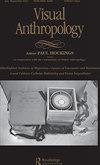Editorial
IF 0.3
Q3 ANTHROPOLOGY
引用次数: 0
Abstract
Visual Anthropology, as its name implies, is primarily an anthropology journal, although we do from time to time present articles in cinema studies or art history. So far as its anthropological content is concerned, we have seen a sea change of sorts, as articles on “the primitive”—which for so long was our bread-and-butter—are perhaps no longer so numerous as articles based on fieldwork in modern Western societies, lands such as Israel, Argentina, Canada, and all parts of Europe; or else in rapidly modernizing nations such as Egypt, India or Vietnam. Recent issues of our journal have included several articles on refugees and other migrants (including one in this issue), alongside articles on imprisoned mothers, colonial policing, health in indigenous communities, political prisoners in a totalitarian state, and fraught issues that surround the development of what were at least notionally indigenous lands and traditional cultures. There is no point in labeling such studies applied visual anthropology: they are straightforwardly approaching biting issues of our own times. And to the extent that they often concern people who have no effective political representation in their own or else their host countries, we anthropologists can at least pinpoint socio-economic issues faced by those people that otherwise tend to go unacknowledged in London, Washington, Brussels or Beijing. No matter what news media we consult, we learn of daily events arising from a panoply of global problems that are forming the constant background to life in the early 21st century. These issues are parsed in a variety of ways depending on political convictions, and all too many aspects are conveniently glossed over or ignored completely by so-called “leaders”: witness the utter silence about climate change and expanding desertification, with the consequent depopulation, in the lead-up to most recent presidential elections. But what is going to happen when northern Africa has to empty much of its populace into Europe or elsewhere? Do Muslim-dominant countries adequately aid their benighted co-religionists? Are United Nations agencies still relevant? At the present moment the outstanding global concern is with overcoming the COVID-19 pandemic, which has rightly been compared to the equally destructive Spanish flu epidemic of a century ago—which, by the way, was only “Spanish” in the rhetoric of a U.S. president who was at pains to “pin the blame” for it overseas (and so took his cue from a baseless French accusation), exactly as ex-President Trump did for what he called the “China virus.” In our own time in a host of “advanced” countries that included Britain, France, Germany, Australia and the United States we have seen large public demonstrations of opposition to the reasonable public health strategies of mask-wearing and vaccinating against COVID-19. It is extraordinary to find that nearly half of all Americans claim a “right” not to wear face masks.编辑
顾名思义,《视觉人类学》主要是一本人类学杂志,尽管我们有时会发表电影研究或艺术史的文章。就其人类学内容而言,我们已经看到了某种程度的巨大变化,因为关于“原始人”的文章——长期以来一直是我们的生计——可能不再像基于现代西方社会、以色列、阿根廷、加拿大和欧洲各地实地调查的文章那么多;或者在埃及、印度或越南等快速现代化的国家。我们杂志最近几期发表了几篇关于难民和其他移民的文章(包括本期的一篇),以及关于被监禁的母亲、殖民地治安、土著社区的健康、极权主义国家的政治犯,以及围绕着至少在名义上是土著土地和传统文化的发展的令人担忧的问题的文章。给这些研究贴上应用视觉人类学的标签是没有意义的:它们直截了当地处理了我们这个时代的尖锐问题。在某种程度上,他们经常关注那些在自己或东道国没有有效政治代表的人,我们人类学家至少可以准确指出那些在伦敦、华盛顿、布鲁塞尔或北京往往不被承认的人所面临的社会经济问题。无论我们咨询什么新闻媒体,我们都会了解到由一系列全球问题引发的日常事件,这些问题正在形成21世纪初生活的持续背景。根据政治信念,这些问题可以以多种方式进行分析,而所谓的“领导人”很容易掩盖或完全忽视了太多方面:在最近的总统选举之前,人们对气候变化和不断扩大的沙漠化以及随之而来的人口减少保持沉默。但是,当北非不得不将大部分人口转移到欧洲或其他地方时,会发生什么?穆斯林占主导地位的国家是否充分帮助他们愚昧的同宗教徒?联合国机构是否仍然具有相关性?目前,全球最关心的问题是克服新冠肺炎疫情,人们理所当然地将其与一个世纪前同样具有破坏性的西班牙流感疫情相提并论——顺便说一句,在一位美国总统的言辞中,这只是“西班牙式的”,他正努力将其“归咎于”海外(因此,他从法国毫无根据的指控中得到了暗示),正如前总统特朗普对他所说的“中国病毒”所做的那样。在我们自己的时代,在包括英国、法国、德国、澳大利亚和美国在内的许多“先进”国家,我们看到了大规模的公众示威,反对戴口罩和接种新冠肺炎疫苗的合理公共卫生策略。令人惊讶的是,近一半的美国人声称有不戴口罩的“权利”。
本文章由计算机程序翻译,如有差异,请以英文原文为准。
求助全文
约1分钟内获得全文
求助全文
来源期刊

Visual Anthropology
ANTHROPOLOGY-
CiteScore
1.00
自引率
50.00%
发文量
19
期刊介绍:
Visual Anthropology is a scholarly journal presenting original articles, commentary, discussions, film reviews, and book reviews on anthropological and ethnographic topics. The journal focuses on the study of human behavior through visual means. Experts in the field also examine visual symbolic forms from a cultural-historical framework and provide a cross-cultural study of art and artifacts. Visual Anthropology also promotes the study, use, and production of anthropological and ethnographic films, videos, and photographs for research and teaching.
 求助内容:
求助内容: 应助结果提醒方式:
应助结果提醒方式:


